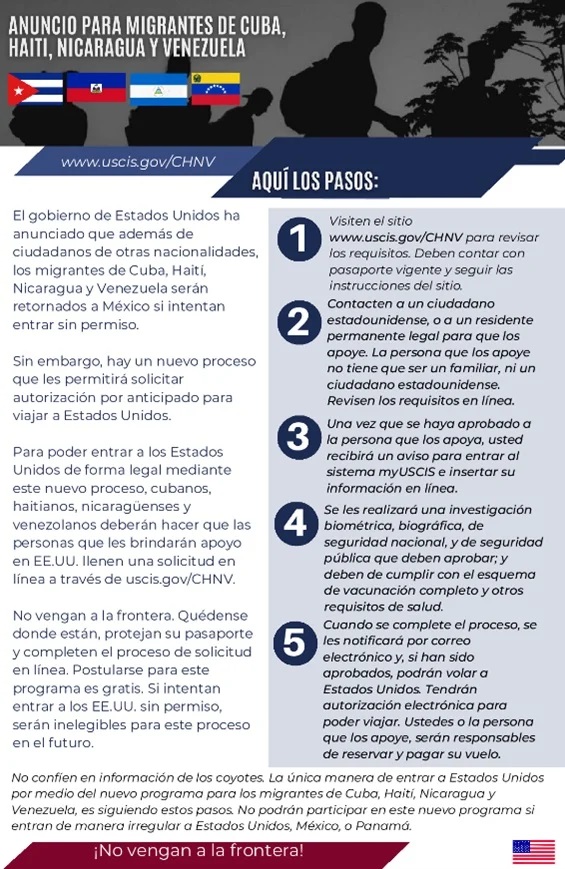Please note that these messages do not represent an official position of UNHCR. Their objective is to provide clear and accurate information to refugees and migrants so that they can make informed decisions together with their families.
If you have additional questions, please visit the U.S. government’s website: Processes for Cubans, Haitians, Nicaraguans and Venezuelans | USCIS
The U.S. government decreed, effective immediately, that nationals from Cuba, Haiti, Nicaragua and Venezuela who irregularly cross the southern border of the U.S. or who cross the Darien (Colombia-Panama border) and arrive in Mexico in an irregular manner will be expelled from the U.S. to Mexico and will not be eligible for this new process to enter the United States.
This measure went into effect:
- Venezuelans – as of 19 October 2022.
- Haitians, Nicaraguans and Cubans: as of 9 January 2023

What is the process to enter the United States?
The U.S. government announced the process for nationals of Cuba, Haiti, Nicaragua and Venezuela and their immediate family members to apply for entry into the United States in a safe and orderly manner. The process is now in effect and the U.S.-Mexico border is closed to persons of the described nationalities if they do not comply with the steps for coordinated entry.
The U.S. government will provide travel authorization for 30,000 people to enter the United States each month through the temporary stay permit process for Cubans, Haitians, Nicaraguans and Venezuelans. This allows for a consistency of operations and arrivals of people seeking a temporary stay.
Note that the measure implies that, with immediate effect, persons of Cuban, Haitian, Nicaraguan and Venezuelan nationality who irregularly cross the southern border of the U.S or who cross the Darien (Colombia-Panama border) and arrive in Mexico irregularly will be deported to Mexico and will not be eligible for this process.
What are the requirements to participate?
As an applicant you must have a “supporter” in the U.S, i.e. a person who can provide financial support during your stay in the U.S. The “support person” may also be a representative of a legal firm or other organization or entity.
The “support person” must be a U.S. national or have regular U.S. immigration status (Residency, citizenship, work permit, asylum, TPS, DED or any other immigration status of regular stay), and financial means to provide financial support.
The supporter will also have to pass security checks.
To participate, you must meet the following requirements:
- Tener una persona de apoyo (supporter) en EE. UU. que les brinde respaldo financiero.
- Superar procesos biométricos y biográficos de seguridad nacional.
- Estar al día con esquemas de vacunación y requisitos de salud pública.
- Tener pasaporte válido para entrar a EE. UU.
- Estar fuera de EE. UU.
- Menores de edad deben viajar acompañados de sus padres o tutor legal.
In what situations can a person not apply to the process?
- If you were ordered to be expelled from the U.S. in the last five years.
- For Venezuelans: if you entered Panama, Mexico or the U.S. as of 19 October 2022.
- For Haitians, Nicaraguans and Cubans: if you entered Panama, Mexico or the U.S. as of 6 January 2023.
- If you are a resident in another country, have dual citizenship or have been recognized as a refugee in another country.
What are the steps to apply for participation?
- Visit the U.S. Citizenship and Immigration Services website to review the requirements. You must have a valid passport and follow the instructions on the website.
- Contact a U.S. citizen or lawful permanent resident for support. Your support person, in this case, does not have to be a family member or a U.S. citizen. Review the requirements in the Online application to become a supporting person and statement of financial support | USCIS
- Once your supporter has been approved, you will receive a notice to log into the myUSCIS system and enter your information online.
- You will undergo a biometric, biographic, national security, and public safety screening that they must pass; and they must meet full immunization and other health requirements.
- When the process is completed, you will be notified by email and, if approved, you will be able to enter the United States by air with electronic authorization to travel. You, or the person supporting you, will be responsible for booking and paying for your flight.
My passport is expired. Do I need to apply for an extension or will my expired passport be accepted?
Yes, each person in the process will need a current and valid passport to travel to the U.S. by air.
In the case of Venezuelan nationals, according to the information published by the U.S. government, please see this additional information about passport validity:
- If the passport was issued before 7 June 2019 (even if it expires before this date), without an extension, it is considered valid and in force for five years after the expiration date printed in the passport.
- A passport issued as of 7 June 2019 without an extension is not considered valid beyond the expiration date printed in the passport.
- Independientemente de la fecha de emisión del pasaporte, con una prórroga emitida antes del 7 de junio de 2019, un pasaporte se considera válido y vigente por cinco años después de la fecha de vencimiento de la prórroga.
- Independientemente de la fecha de emisión del pasaporte, con una prórroga emitida a partir del 7 de junio de 2019, un pasaporte se considera válido y vigente hasta la fecha de vencimiento de la prórroga.
Can minors travel without a passport, only with the passport of their parents or guardians?
People under 18 years of age traveling with their parents or guardians must have their own passport and cannot be included in the passport of a parent or guardian.
For more information, please refer to the following links:
Processes for Cubans, Haitians, Nicaraguans and Venezuelans | USCIS
